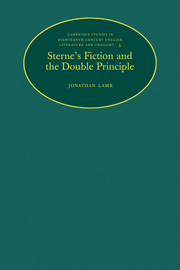Summary
When Locke's influence on Sterne's fiction began to be canvassed fully, roughly forty years ago, critics assumed that the disorderly narrative of Tristram Shandy was a fictional demonstration of Locke's account of the association of ideas. But owing to Locke's cursory and disapproving treatment of the topic, there was little leeway for the reader beyond taking the hobbyhorse for a comical example of ‘this sort of unreasonableness … this sort of madness’. James Work was not unusual in claiming that ‘the most important structural device is the principle of the association of ideas upon which the whole progression of the book is based’ (TS, p. xlix). When John Traugott dismantled this assumption in what remains one of the most authoritative studies of Sterne, and one of the most detailed considerations of Locke's effect on Sterne's fiction, he observed that Sterne's ‘history of the mind is not Locke's history, but it is one informed by the contemporary development of Locke's notion of association-of-ideas madness into an epistemology such as Hume's’. The reason Traugott's hint in Hume's direction has been so seldom improved is that evidence of Sterne's reading of Locke litters both his novels, whereas there is little in the way of verbal echo or allusion to link him distinctly to any of the associationist philosophers. But if Locke's polemical afterthought to his third edition of the Essay is assumed to provide the model for the depicted and depicting hobbyhorses of Tristram Shandy, then there is little choice but to see them as involuntary deviations from normative patterns of thought and speech.
- Type
- Chapter
- Information
- Sterne's Fiction and the Double Principle , pp. 56 - 82Publisher: Cambridge University PressPrint publication year: 1989



